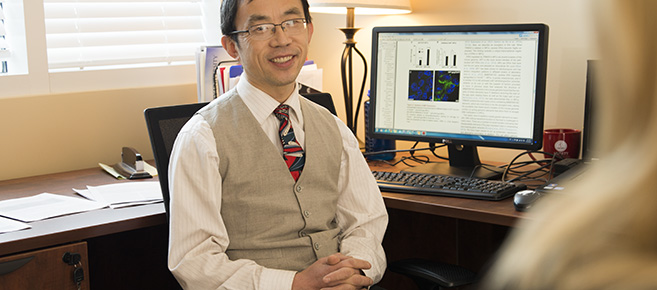Tuesday, January 13, 2015
Yingguang Liu, Ph.D.
Tue, 13 Jan 2015Troy Burnett :: LUCOM Marketing & PR
 German scientist GeorgLichtenberg once said, “Sickness is mankind’s greatest defect.” Throughout mankind, where there is sickness, there has always been a search for a cure. This month’s faculty spotlight focuses on Yingguang Liu, Ph.D., who possesses a long history of researching a cure for a specific disease that has evaded him, yet through his search he found the “cure” we each seek for his own soul.
German scientist GeorgLichtenberg once said, “Sickness is mankind’s greatest defect.” Throughout mankind, where there is sickness, there has always been a search for a cure. This month’s faculty spotlight focuses on Yingguang Liu, Ph.D., who possesses a long history of researching a cure for a specific disease that has evaded him, yet through his search he found the “cure” we each seek for his own soul.
With humble beginnings, Dr. Liu grew up in a rural village in Northern China. The Liu family were farmers and experienced tough times frequently when crops resulted in not meager harvests to fulfill the needs of the family and community alike. “As farmers, my family was considered in the lowest class of China’s socio-economic system. There was not much hope of a prosperous future,” said Dr. Liu.
For Dr. Liu, an amazing opportunity presented itself during his teenage years when reformation in Chinese government led to reinstating the National College Admission Exam. Success with this exam granted a college education to all Chinese citizens, regardless of family and socio-economic backgrounds. The opportunity, however, was heavily contingent upon having high scores. At the time, only 10% of high school students in Dr. Liu’s area were admitted to college.
Despite the odds against him associated with his rural upbringing and rural primary education system, Dr. Liu earned the scores needed not only to pass the exam but also to be accepted to attend Shandong Medical University in Jinan, China. Completing a six-year program, he earned his undergraduate degree in medicine and continued to Shanghai, China. There he received a Master of Medicine in Microbiology at Shanghai Medical University.
As Dr. Liu recalls, those early years were a humbling time in his life. “Being born into a class of poverty to becoming an astute scholar is ideal, yet, not common. It is true, that having a science career in China can lead to a life of fame and fortune, but I wanted to do something else. I wanted to help my people, rather than trying to get ahead.”
Following his graduate degree, Dr. Liu moved back to Jinan to offer aid for those infected with viral diseases. “There was a dire need for my medical specialty. In my four years as a physician, I encountered countless patients suffering from chronic viral hepatitis B,” added Dr. Liu. His efforts were beneficial for the natives of Shandong province, but shortly thereafter Dr. Liu moved to the United States and attended Ohio University at Athens, Ohio. Wanting to do more to address the issue of viral hepatitis B, he enrolled and obtained his Ph.D. in Biological Sciences hoping to discover a cure.
“It was my goal to find a cure for viral hepatitis, but what I eventually found was a cure for my soul,” said Dr. Liu.
At the beginning of his doctoral studies, Dr. Liu was introduced to a Chinese Christian fellowship. “I encountered Christians for the first time in my life during the time I conducted my research. I attended weekly Bible studies, surveyed the Scriptures, and became captivated at how the Psalms prophesied about the coming King,” said Dr. Liu. “I became convinced of God’s existence and I accepted Jesus Christ as my personal Lord and Savior.”
According to Dr. Liu, Christian love was something he never experienced in China.
Since then, Dr. Liu has become passionate about creationism. When time permits, he conducts public speeches on creationism throughout academic and popular platforms. One of those platforms is the International Conference on Creationism (ICC), one the world’s premier gatherings of creation researchers since 1986.
Prior to joining the inaugural faculty of Liberty University College of Osteopathic Medicine (LUCOM), Dr. Liu taught at Maranatha Baptist University (MBU). Throughout his twelve-year tenure at MBU, he taught as a professor of biology, chemistry, and physics. Additionally, he published numerous works and articles, one of which was “The Natural History of Retroviruses: Exogenization vs Endogenization.” This specific work explored the possibilities of exogenous retroviruses (a retrovirus not normally present in healthy hosts) being originated from endogenous retroviruses (DNA sequences in cellular genomes essential for some cellular functions).
Today, Dr. Liu serves as a founding faculty member at LUCOM in the role of Associate Professor of Microbiology in the Department of Molecular and Cellular Sciences. According to Ronnie Martin, D.O., FACOFP-dist., dean of LUCOM, “Dr. Liu brings a wealth of knowledge through his medical background, clinical experience and research training. His passion to both serve and teach others how to serve through ministries of medicine and research are essential assets to our founding team, as well as, embodying our mission and vision.”
Outside of Dr. Liu’s education responsibility’s, he is involved in the Lynchburg Chinese Christian Fellowship (LCCF). The LCCF provides opportunities for worship in Mandarin, the principle Chinese language, as well as, outreach and fellowship for members of the local Chinese community from all walks of Life. Dr. Liu also leads the Chinese Creation Science Association, ministering to the Chinese church through publications in creation science.
As Dr. Liu recalls, you never know where the Lord will take you. “I was born into a small and poor area across the world, was blessed with so many experiences, and now I serve in a Christian university unlike any other. I continue my research and I serve others with what I am passionate about. I am truly blessed.”